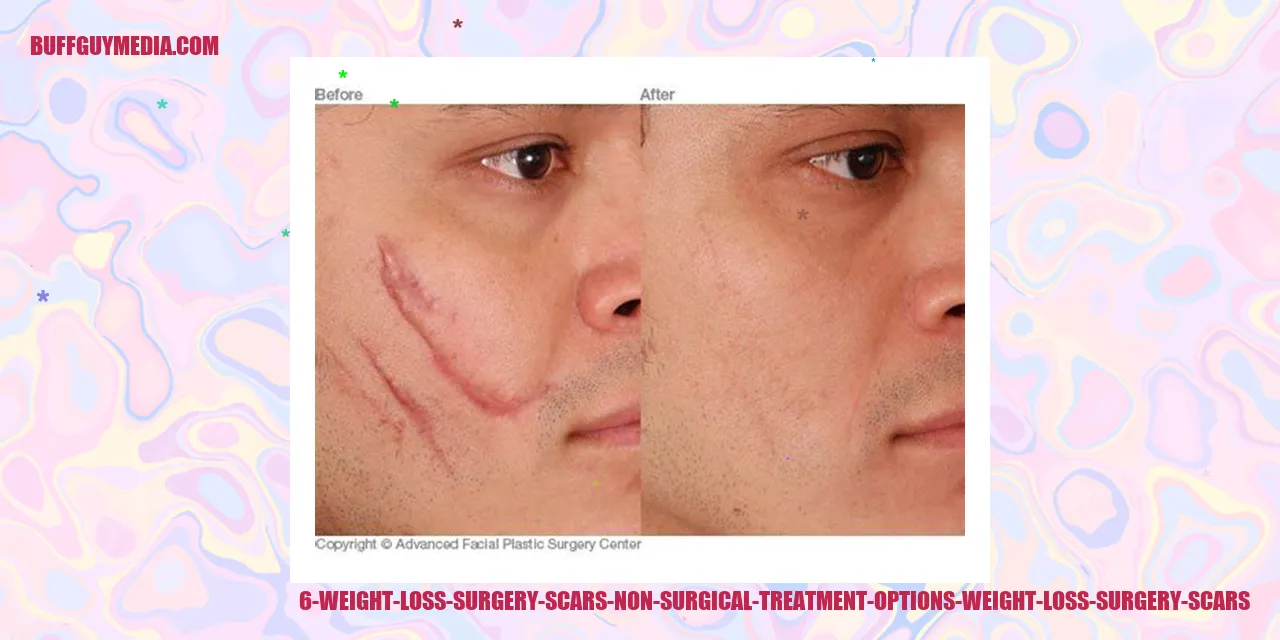Weight Loss Surgery Scars: Understanding and Minimizing the Impact
The Impact of Weight Loss Surgery on Skin – Understanding Scarring Processes
Different Types of Scarring
Weight management surgeries, such as bariatric procedures, often lead to various types of scars owing to the unique techniques used during surgery. The most prevalent forms of scarring resulting from these weight loss surgeries include:
- Vertical Scars: These scars typically manifest as a vertically-oriented line, extending from the sternum to the naval, and are often associated with gastric bypass surgery.
- Horizontal Scars: Usually forming a horizontal line across the abdomen, these scars are more commonly observed in procedures like gastric sleeve surgery.
- Incision Scars: These smaller scars result from the incisions made during minimally invasive laparoscopic weight loss surgeries, where specialized surgical instruments are used through small cuts.
Effective Strategies for Scar Management
Implementing proper scar management techniques is key to minimizing their appearance and facilitating optimal healing. Consider the following strategies:
- Maintaining Cleanliness: Keep the incision area clean and dry to prevent the risk of infections.
- Utilizing Compression Garments: Wearing compression garments recommended by your surgeon provides support and minimizes tension on the scars.
- Topical Solutions: Apply scar creams or ointments enriched with silicone, vitamin E, or aloe vera to facilitate healing and improve the scar’s texture.
- Scar Massage: Gently massage the scars with firm pressure in circular motions to break down scar tissue and enhance blood circulation.
[[READMORE]]
Addressing Scar Discoloration
Scarring can often be accompanied by discoloration, posing a concern for individuals who have undergone weight loss surgery. Consider the following approaches to reduce scar discoloration:
Also read:
Juno Temple Weight Loss: Achieving a Healthier and Fitter Body
Mother Bucker Pre Workout: Boost Your Energy and Performance
- Sun Protection: Shield the scars from sun exposure by regularly applying sunscreen with a high SPF to prevent them from darkening.
- Scar Lightening Products: Explore over-the-counter scar lightening creams or serums containing ingredients such as kojic acid, hydroquinone, or vitamin C.
- Professional Treatments: Consult a dermatologist for professional treatments like chemical peels or laser therapy to address severe scar discoloration.
Efforts to Minimize Scar Visibility
While scars resulting from weight loss surgery are inevitable, there are steps individuals can take to minimize their overall appearance:
- Adopting a Healthy Lifestyle: Follow a proper diet and exercise regimen prescribed by healthcare providers to minimize weight gain or fluctuations.
- Abstaining from Smoking: Avoid smoking, as it can impede the healing process, increase the risk of developing more prominent scars, and negatively affect overall health.
- Optimal Skincare: Keep the scars moisturized using hypoallergenic lotions or oils to improve their texture and elasticity.
Remember, it is crucial to consult with a qualified healthcare professional or surgeon for personalized advice and guidance on scar management after weight loss surgery.

The Journey of Healing: Understanding Weight Loss Surgery Scars
The Healing Process: Stages of Scar Recovery
Weight loss surgery can be a life-changing experience, but it often leads to visible scars. Familiarizing yourself with the stages of scar healing can assist you in navigating this aspect of your recovery. Initially, after the surgery, scars may appear red and swollen. This is the first phase of healing known as the inflammatory stage, which usually lasts for a few weeks. Over time, the scars gradually become less prominent, flatten out, and enter the proliferative stage. Eventually, they enter the maturation stage, where they continue to soften and lighten in color.
Nurturing Your Surgical Incisions
Effectively caring for your surgical incisions is essential to promote optimal healing and minimize the appearance of scars. Adhering to your surgeon’s wound care instructions is crucial. This includes keeping the incisions clean, dry, and protected. Avoid excessive manipulation or picking at scabs to prevent infections and facilitate healthy healing. Additionally, maintaining a healthy lifestyle, including a balanced diet and regular exercise, can contribute to more favorable wound healing outcomes.
Preventing Scar Infections
In order to ensure the overall success of your weight loss surgery, preventing scar infections is of utmost importance. To reduce the risk of infection, it is vital to maintain clean and dry surgical incisions. You may be required to use antibiotic ointments or specific dressings as advised by your surgeon. It is important to refrain from submerging the incisions in water, such as swimming or taking baths, until you have the green light from your doctor. Regularly monitoring the incisions for any signs of infection, such as redness, swelling, or discharge, is also crucial.
The Significance of Follow-up Care
Follow-up care following weight loss surgery plays a vital role in evaluating the progress of healing and addressing any concerns related to scars. Your surgeon will schedule regular appointments to monitor your healing process, manage any complications, and provide necessary treatments to enhance scar recovery. By attending these follow-up visits and communicating any concerns you may have, you can ensure that your weight loss surgery scars heal as smoothly as possible, both physically and emotionally.
Understanding the Impact of Weight Loss Surgery Scars on Body Image

The Psychological Effects of Scarring
Weight loss surgery is a transformative procedure that positively affects physical health and overall well-being. However, it is important to recognize the psychological impact of the scars left behind after the surgery. These scars can significantly influence an individual’s body image and self-esteem.
For many individuals, weight loss surgery scars act as constant reminders of past struggles with obesity. These individuals may feel self-conscious or ashamed of their scars, anticipating judgment and negative reactions from others. Consequently, a decrease in self-confidence and a negative perception of one’s body may occur. It is crucial to acknowledge and address the psychological impact that scarring can have on post-surgery individuals.
Coping with Changes in Body Image
Dealing with changes in body image following weight loss surgery can be challenging. However, it is essential to prioritize self-acceptance and self-care. Embracing scars as symbols of a journey towards a healthier life is vital. Seeking support from healthcare professionals, such as psychologists or counselors, can assist in navigating these changes and fostering a positive body image.
Additionally, joining support groups or seeking peer support from fellow weight loss surgery individuals can provide a sense of community and shared experiences. These groups offer valuable insights and coping strategies for managing body image changes and the emotional challenges that accompany them.
Support and Counseling Services
Recognizing the psychological impact of weight loss surgery scars, many healthcare facilities now provide support and counseling services to post-surgery individuals. These services aim to address the emotional and psychological aspects of scarring and changes in body image.
Support and counseling services may involve individual therapy sessions, group therapy, or workshops centered around body positivity and self-acceptance. These resources equip individuals with the tools and strategies necessary to navigate body image issues and cope with the psychological impact of scarring.
Embracing Positive Body Affirmations
Practicing positive body affirmations is a valuable strategy for individuals who have undergone weight loss surgery and are grappling with body image concerns. Repeating affirmations like “I appreciate the strength and resilience of my body” or “I embrace my scars as evidence of my journey” can shift the focus towards acceptance and self-love.
Consistently incorporating these affirmations into one’s routine can have a profound influence on mindset and overall well-being. When combined with support from healthcare professionals and a supportive community, positive body affirmations can empower individuals to overcome the psychological impact of scarring and develop a healthier body image.
In conclusion, weight loss surgery scars can have a profound psychological impact on individuals. Coping with changes in body image and addressing emotional challenges requires support, counseling services, and the practice of positive body affirmations. By prioritizing self-acceptance and embracing scars as part of their journey, individuals can cultivate a positive body image and enhance their overall well-being.

Understanding the Risks and Complications of Weight Loss Surgery Scars
Potential Complications Related to Scarring
Weight loss surgery, or bariatric surgery, has gained popularity as a solution for severe obesity. While it offers numerous health benefits, it’s important to consider the potential risks and complications associated with the resulting scars.
One common complication is the formation of hypertrophic or keloid scars. These scars are raised, reddish, and thick, extending beyond the original incision. They can cause discomfort, itchiness, and dissatisfaction with appearance. Although relatively rare, individuals with a history of these scars may be more prone to developing them after weight loss surgery.
Another potential complication is wound dehiscence, which refers to the reopening of the incision either partially or completely. This can delay healing, increase the risk of infection, and result in wider scars. Patients with poor wound healing capacity or those experiencing tension on the incision site may be more susceptible to this complication.
Challenges in Wound Healing
Weight loss surgery scars may encounter difficulties in the wound healing process. Factors such as smoking, diabetes, obesity, malnutrition, and certain medical conditions can contribute to poor healing. Patients considering weight loss surgery should address these risk factors beforehand to minimize the chances of wound healing problems and related scar complications.
In some cases, weight loss surgery scars may take longer than expected to heal, leading to delayed recovery and potential wound-related issues. Prolonged wound healing can result in infection, excessive scarring, and unsatisfactory cosmetic outcomes. Therefore, thorough wound care and regular follow-ups with healthcare professionals are crucial to monitor progress and address complications promptly.
Scarring in Different Body Areas
Weight loss surgery scars can appear in various body areas depending on the specific procedure performed. Common areas include the abdomen, thighs, arms, and breasts. The visibility and extent of scars depend on factors such as skin type, healing ability, and surgical technique.
It’s important for individuals considering weight loss surgery to consult with their healthcare provider regarding scarring in different body areas. Understanding the location and characteristics of scars can help manage expectations and make informed decisions about the surgery.
Revision Surgery for Scar Improvement
When weight loss surgery scars become problematic or aesthetically undesirable, revision surgery may offer an option for scar improvement. This procedure aims to minimize the appearance of scars, reduce their visibility, and enhance overall cosmetic outcomes.
However, it’s essential to note that revision surgery carries its own set of risks and complications. It may require additional incisions, potentially leading to further scarring and prolonging the recovery process. Individuals should thoroughly discuss the benefits, risks, and potential outcomes with their healthcare provider before deciding on revision surgery.
In conclusion, it’s crucial for individuals considering weight loss surgery to be aware of the risks and complications associated with scars. Understanding potential scar-related complications, challenges in wound healing, scarring in different body areas, and the option of revision surgery for scar improvement is important. Consultation with healthcare professionals is vital for making informed decisions, managing expectations, and minimizing the impact of these complications on the overall outcome of weight loss surgery.

Preventing Sun Damage to Weight Loss Surgery Scars
The Impact of Sun Exposure on Scars
The sun’s harmful ultraviolet (UV) rays can have adverse effects on scars resulting from weight loss surgery. Sun exposure can cause scars to darken and become more noticeable, especially during the healing process. Long-term sun exposure can also lead to pigmentation irregularities, such as hyperpigmentation or hypopigmentation, where the scar tissue appears darker or lighter than the surrounding skin.
Protecting Scars from the Sun
Proper sun protection is crucial to minimize the visibility of weight loss surgery scars and promote optimal healing. Applying sunscreen with a high sun protection factor (SPF) to the scarred area whenever it is exposed to the sun is one of the simplest and most effective methods. Choose broad-spectrum sunscreens that provide protection against both UVA and UVB rays.
Sunscreen Selection and Scar Care
Selecting the right sunscreen is essential for scar care. Opt for sunscreens specifically formulated for sensitive or post-surgical skin. These sunscreens are typically fragrance-free, hypoallergenic, and non-comedogenic, meaning they won’t clog pores. Apply an ample amount of sunscreen to ensure complete coverage of the scarred area.
Using UV-Protective Clothing for Scar Coverage
Alongside sunscreen, wearing UV-protective clothing can provide additional shielding for weight loss surgery scars. Look for clothing with a high ultraviolet protection factor (UPF) to minimize the impact of harmful UV rays. This can include long-sleeved shirts, wide-brimmed hats, and pants or skirts made from UV-protective fabrics. These garments can effectively reduce direct sun exposure to scars, reducing the risk of darkening or pigmentation irregularities.
Remember, prevention is key when it comes to safeguarding weight loss surgery scars from sun damage. Consistently practice sun protection measures to avoid potential complications and ensure the best possible scar healing outcome. By taking the necessary precautions, you can help your scars fade over time, leading to a smoother and more aesthetically pleasing appearance.

Cutting-edge Approaches to Address Weight Loss Surgery Scars
Revolutionary Laser Therapy for Scar Reduction
Weight loss surgery can leave individuals with visible scarring that affects their physical appearance and self-esteem. Fortunately, advanced non-surgical treatment options are now available to mitigate the appearance of weight loss surgery scars.
One such innovative approach is laser therapy for scar reduction. This procedure employs lasers to target scar tissue, prompting the production of collagen and elastin for skin cell rejuvenation. Laser treatment can effectively diminish scars, rendering them less noticeable over time.
Gentle Scar Massage Techniques
Another non-invasive treatment option for weight loss surgery scars involves scar massage. Through gentle rubbing of the affected area, blood circulation improves, aiding the growth of healthier skin cells. Scar massage also plays a role in softening scar tissue and minimizing its appearance. To achieve optimum results, it is crucial to consult with a professional to learn the proper massage techniques.
Utilizing Silicone Sheets and Scar Gels
Employing silicone sheets or scar gels is a widely recommended non-surgical treatment for weight loss surgery scars. These products create a protective barrier over the scar, hydrating the skin and reducing redness and inflammation. Silicone sheets can be worn round the clock, while scar gels are directly applied to the scar. Consistent usage over time can yield significant improvement in the appearance of weight loss surgery scars.
Improving Scars through Chemical Peels
Chemical peels are also recognized as an effective non-surgical treatment option for weight loss surgery scars. This procedure involves the application of a chemical solution to the scarred area, stimulating the shedding of the top layer of skin. As new skin cells form, the scar’s visibility is often reduced. Chemical peels can be tailored to individual needs, and repeated sessions may be required for optimal outcomes.
Weight loss surgery scars can significantly impact an individual’s self-esteem. However, with cutting-edge non-surgical treatments, it is possible to minimize their appearance and regain confidence. Laser therapy, scar massage, silicone sheets and scar gels, as well as chemical peels, are all viable options worth considering. To determine the most suitable treatment plan for your unique situation, consult a qualified professional.

The Options for Treating Weight Loss Surgery Scars
Scar Revision Surgery
Scar revision surgery presents a viable solution for reducing the visibility of scars resulting from weight loss surgery. Through this procedure, the old scar tissue is removed and reshaped to blend seamlessly with the surrounding skin. By undergoing scar revision surgery, individuals can achieve a significant improvement in the appearance of their scars, rendering them less conspicuous and more aesthetically pleasing.
Skin Grafting for Scar Repairs
Another effective surgical option for tackling weight loss surgery scars is skin grafting. This approach involves taking healthy skin from a donor site on the body and transplanting it to the scarred area. Skin grafting can greatly enhance the texture, color, and overall appearance of scars, making it particularly beneficial for large scars or those that struggle to heal naturally.
Scar Camouflage Tattoos
For individuals seeking a non-surgical alternative to address weight loss surgery scars, scar camouflage tattoos provide a viable solution. This technique entails the use of tattoo pigments carefully matched to the color of the scar and surrounding skin. By strategically applying these pigments, scars can be effectively concealed, resulting in a less noticeable appearance. Scar camouflage tattoos offer an attractive option for individuals who prefer a non-invasive approach to scar treatment.
Experts Specializing in Scar Revision
When exploring surgical treatment options for weight loss surgery scars, it is crucial to consult with professionals who specialize in scar revision. These highly-skilled experts possess extensive experience in scar management and can tailor personalized treatment plans to meet individual needs. Surgeons specializing in scar revision have access to advanced techniques and technologies that ensure optimal results are achieved.
In conclusion, weight loss surgery scars can be effectively addressed through a range of surgical options. Scar revision surgery, skin grafting, and scar camouflage tattoos are among the available treatment choices. Consulting with a surgeon specializing in scar revision is essential in determining the most suitable treatment plan for minimizing the visibility of weight loss surgery scars.]

Dietary and Nutritional Considerations for Weight Loss Surgery Scars
The Significance of Proper Nutrition in Scar Healing
Proper nourishment plays a pivotal role in the recovery of weight loss surgery scars. Following the ordeal of weight loss surgery, the body undergoes considerable trauma that results in the formation of scars. Essential nutrients are crucial for repairing the damaged tissues and facilitating effective healing of the scars.
The Role of Vitamins and Minerals in Scar Recovery
Vitamins and minerals are fundamental for promoting scar recovery post-weight loss surgery. Vitamin C, for instance, is renowned for its ability to stimulate collagen synthesis, thereby enhancing the strength and repair of scar tissue. Vitamin E possesses antioxidant properties that can minimize scarring, while zinc contributes to wound healing and scar formation.
The Influence of Protein Intake on Scar Tissue Formation
Adequate protein intake is vital for the formation of scar tissue. Following weight loss surgery, the body necessitates protein to rebuild and restore tissues. Incorporating sufficient amounts of high-quality protein sources such as lean meats, fish, dairy products, and legumes can facilitate the development of healthy scar tissues.
The Importance of Hydration for Scar Elasticity
Maintaining proper hydration is fundamental in preserving scar elasticity. Adequate water intake ensures that the skin remains hydrated and flexible, leading to better elasticity of the scar tissue. Hydration also fosters overall healing by facilitating proper blood flow and the delivery of essential nutrients to the site of the scar.

All About Weight Loss Surgery Scars
How long does it take for weight loss surgery scars to fade?
The fading process of weight loss surgery scars can vary, ranging from several months to a couple of years. The duration primarily depends on factors like individual healing capacity, the depth and size of the incisions, and proper scar care. Each person’s healing journey is unique, so it is important to remain patient throughout the process.
Can scar creams and ointments be helpful?
Scar creams and ointments might assist in improving the appearance of weight loss surgery scars. These products often contain ingredients such as vitamin E, silicone, or onion extract, which can moisturize the skin and stimulate collagen production. However, the effectiveness can differ from person to person. It is advisable to consult a dermatologist or plastic surgeon for personalized recommendations.
What factors affect the healing of scars?
Several factors influence the healing process of weight loss surgery scars. Firstly, overall health and immune system strength play a crucial role. Smokers tend to experience slower healing and more prominent scars compared to non-smokers. Additionally, proper wound care, balanced nutrition, and minimizing tension on the incision site contribute to scar healing. Adhering to post-operative instructions given by the surgeon can optimize the healing process.
Are there non-invasive scar treatment options available?
Absolutely, there are non-invasive treatment options for weight loss surgery scars. These include laser therapy, microdermabrasion, chemical peels, and silicone gel sheets or patches. These treatments aim to remodel collagen, reduce scar visibility, and enhance overall skin texture. However, the suitability of these treatments depends on the scar type and individual factors. Consulting with a dermatologist or plastic surgeon is recommended for determining the most suitable treatment option.
In conclusion, weight loss surgery scars require time to naturally fade and their appearance can be influenced by various factors. While scar creams and ointments may offer some benefits, proper wound care and seeking professional advice for personalized scar treatments are essential. Understanding the healing process and managing expectations can guide individuals towards achieving a more improved appearance post-weight loss surgery.









